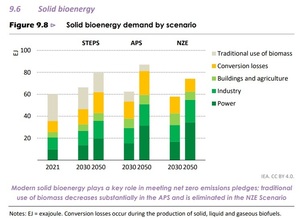King, Collins introduced updated BTU Act
Energy Disrupter
ADVERTISEMENT
Sens. Angus King, I-Maine, and Susan Collins, R-Maine, on April 20 announced the reintroduction of an updated Biomass Thermal Utilization Act, which aims to provide tax credits for commercial and industrial wood heating appliances. It would also extend and increase the existing residential tax credit.
A tax credit for residential wood heating appliances was established last year. In late 2020, President Trump signed a legislative package that included certain provisions of an earlier version of the BTU Act. That bill established a three-year investment tax credit (ITC) for high-efficiency home heating equipment that fires wood pellets, chips, or cordwood.
The current residential credit applies to the installed cost of home heating and hot water systems that utilize wood pellets, chips and cordwood at efficiencies greater than 75 percent high heat value. The ITC is for 26 percent in 2021 and phases down to 22 percent in 2022 and 2023.
King and Collins are now working to enact a similar credit for commercial and industrial applications and increase and extend the existing residential credit through 2028.
Specifically, the bill aims to add biomass fuel property to the list of existing technologies that qualify for the Section 48 business ITC at an initial rate of 30 percent before expiring at the end of 2028. To qualify, the biomass fuel property must operate at a thermal efficiency rate of at least 75 percent and be used to either heat space within the dwelling or heat water. The bill would also restore the existing Section 25 ITC for residential wood heating systems to 30 percent, while also extending the credit through 2028.
“Biomass has proven to be an affordable and sustainable alternative to keep homes and businesses warm during the cold Maine winters, while also creating new opportunities for Maine’s forest products industry,” King said. “Our bipartisan bill would encourage homeowners to pivot to this cleaner, cheaper method of heating, and support our state’s historic forest industry in the process. Utilizing our state’s plentiful natural resources to meet our energy needs is a win-win, supporting local economies and providing Maine consumers with cost-effective and efficient fuels.”
“Wood biomass is a cost-effective, renewable, and environmentally friendly source of energy that helps individuals heat their homes in the winter months and creates jobs here in Maine,” Collins added. “By providing biomass thermal energy technologies the same tax treatment as other forms of renewable energy, this legislation would encourage the use of highly efficient biomass heating systems.”
“Passing the BTU Act would be a big win for the Maine economy and the health of the forest. The increased demand for biomass heating systems would put more Mainers to work and incentivize businesses to make the switch from oil and gas heating systems,” said Dana Doran, executive director of the Professional Logging Contractors of Maine. “If this bill passes, it will create jobs, reduce Maine’s carbon emissions, and allow forests to be properly managed by strengthening the market for low grade wood fiber. We are very thankful for the continued leadership of Senators King and Collins on this vital piece of legislation.”
“We applaud Senators King and Collins for reintroducing the BTU Act. This important legislation will increase the affordability of today’s efficient and clean burning wood and pellet heaters,” said Jack Goldman, president & CEO of the Hearth, Patio & Barbecue Association. “This means more money in consumers’ pockets and cleaner air in their community. Small businesses who have just gone through an unprecedented year of uncertainty and losses will greatly benefit from having a tax credit to incentivize customers to do some shopping and purchase that next-level wood or pellet heater.”
To date, Sens. Maggie Nassan, D-N.H., and Jeanne Shaheen, D-N.H, have signed on to cosponsor the bill.
















